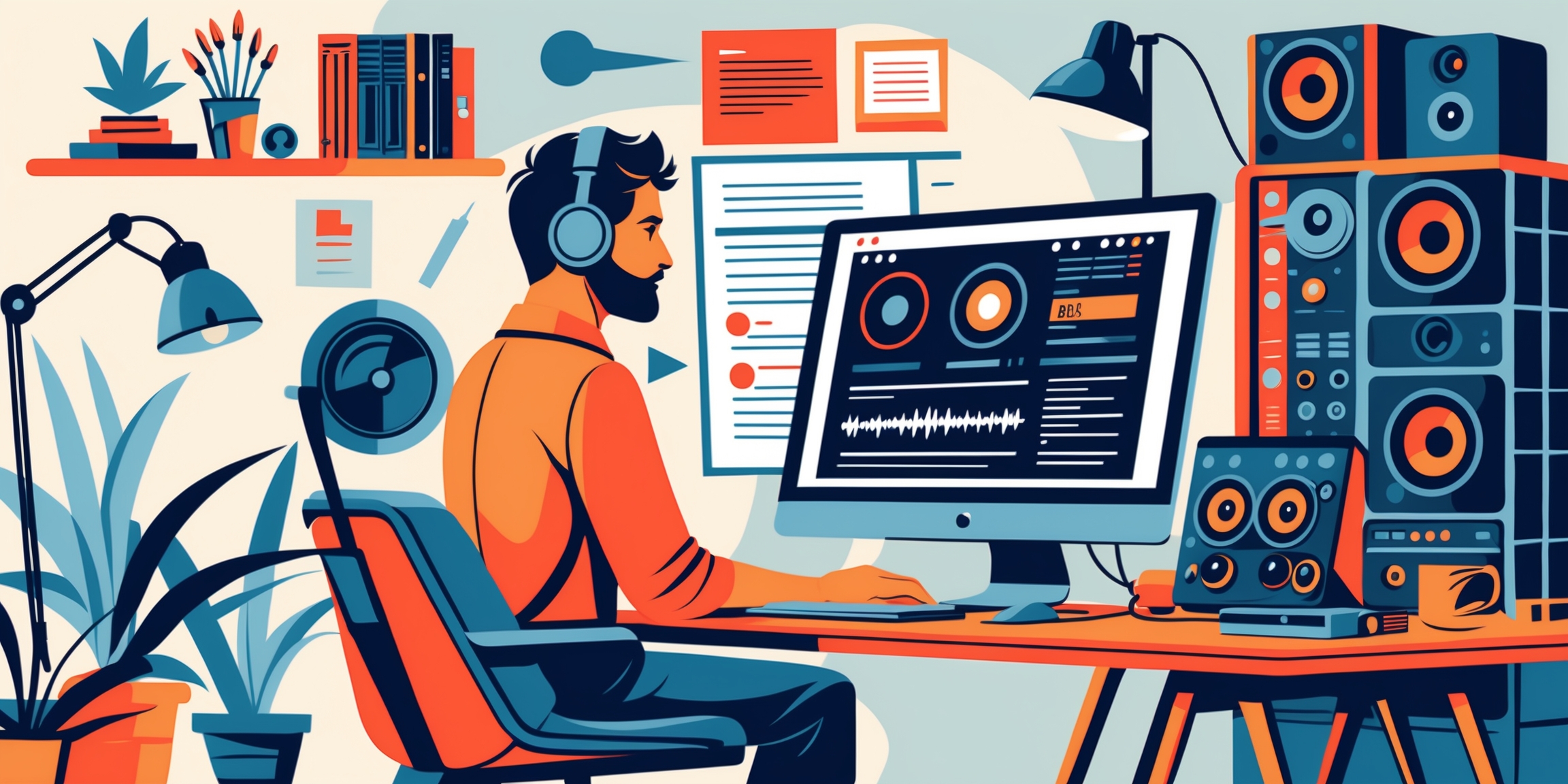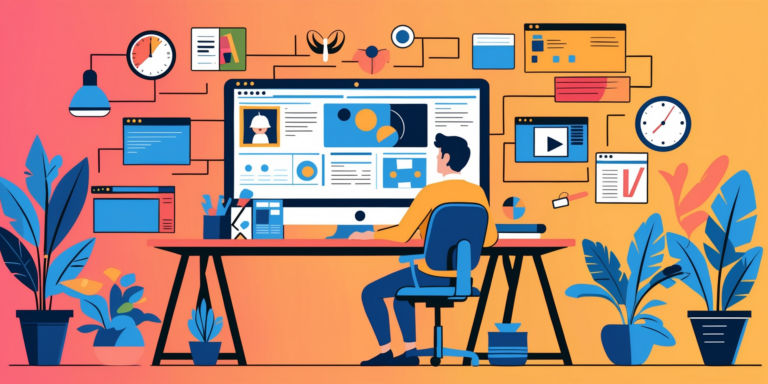Table of Contents
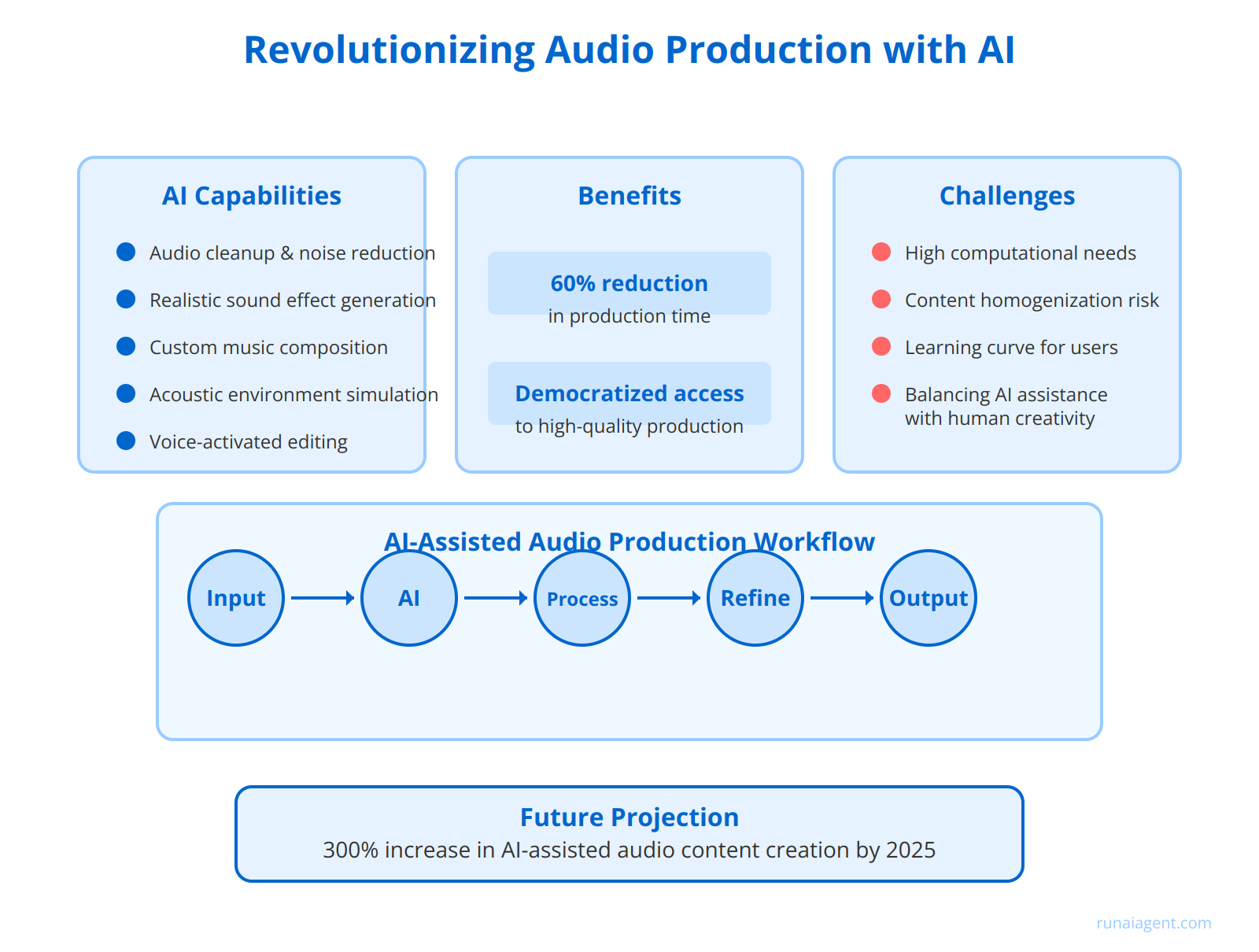
Revolutionizing Audio Production: How AI Agents Are Transforming the Industry
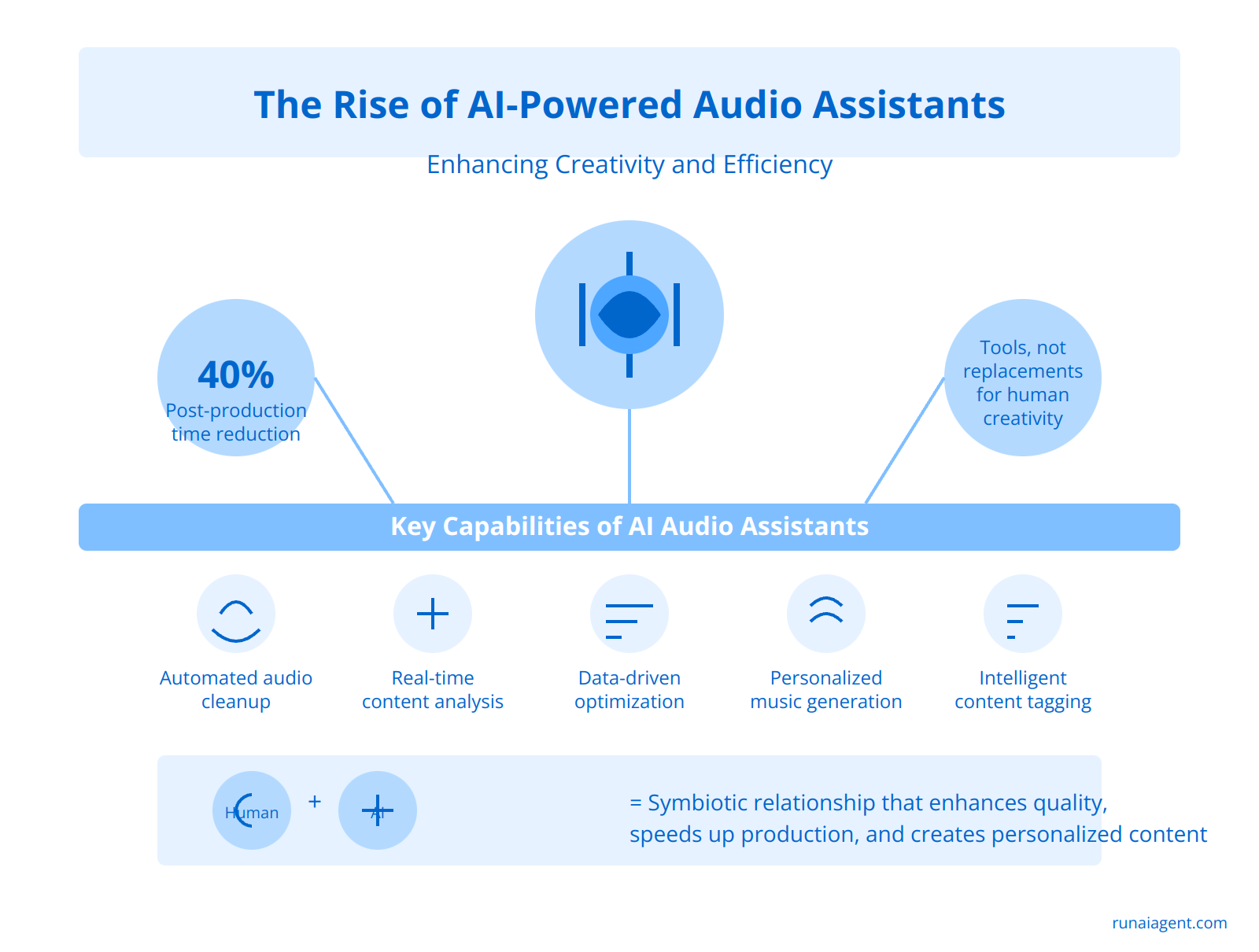
The Rise of AI-Powered Audio Assistants: Enhancing Creativity and Efficiency
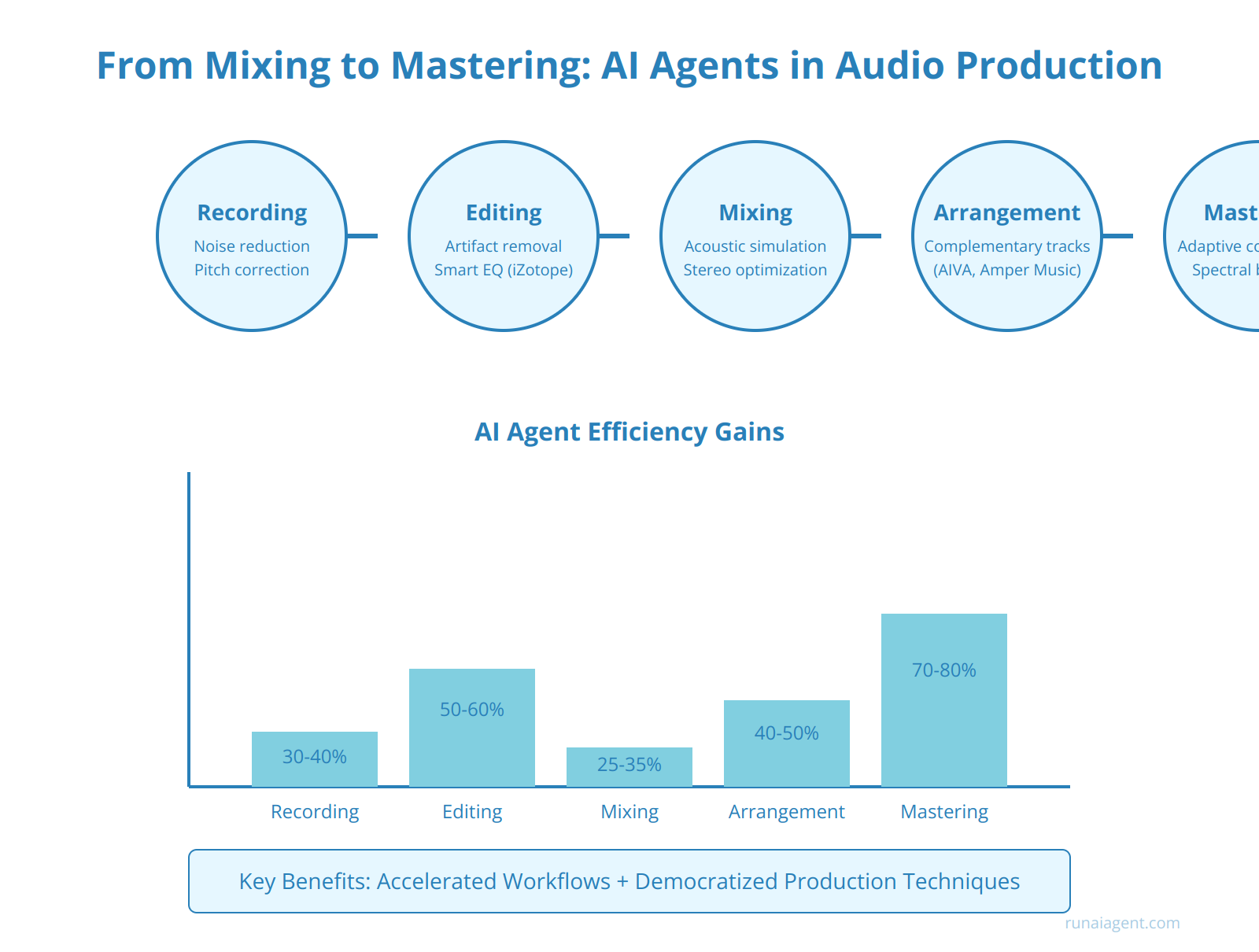
From Mixing to Mastering: AI Agents in Every Stage of Audio Production
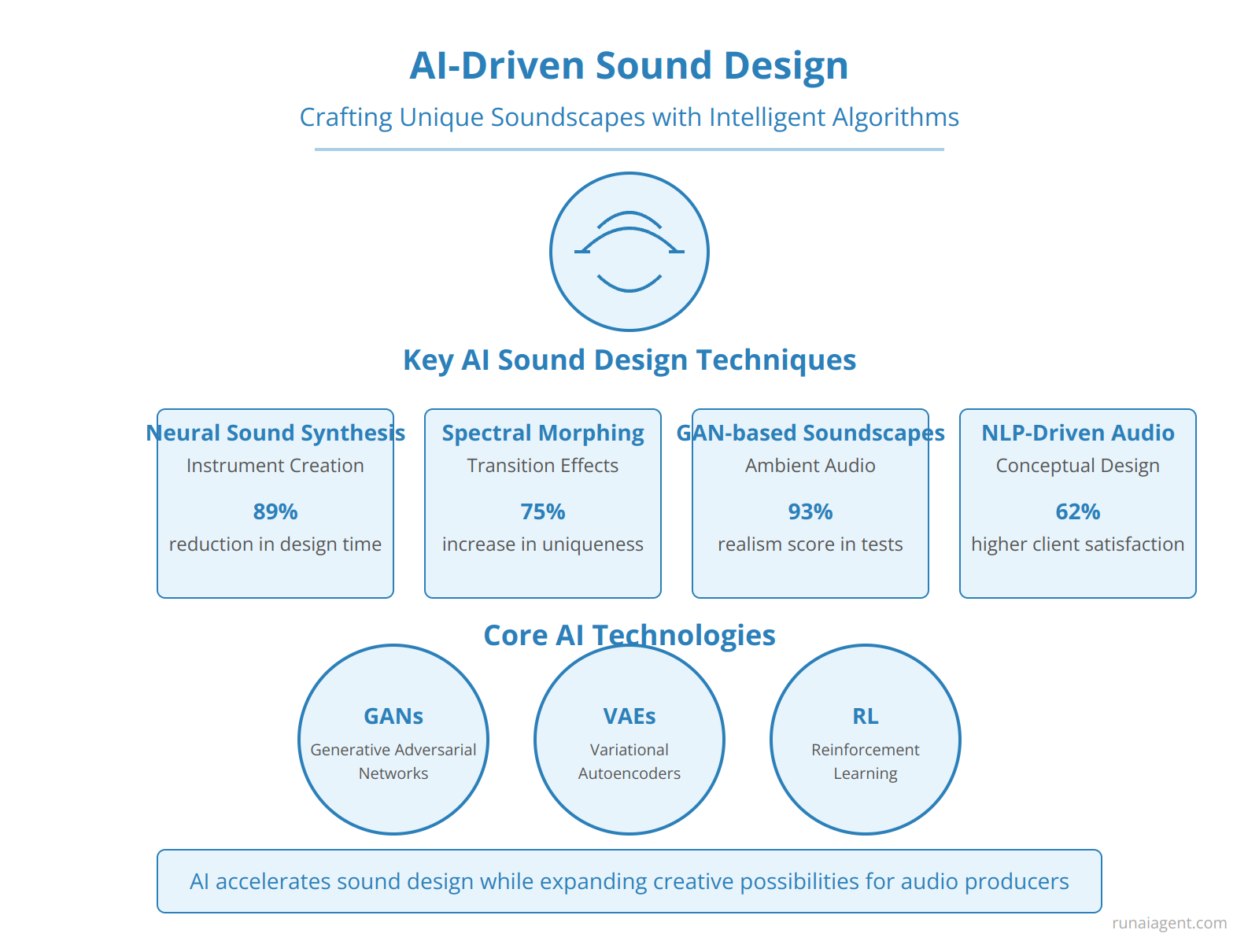
AI-Driven Sound Design: Crafting Unique Soundscapes with Intelligent Algorithms
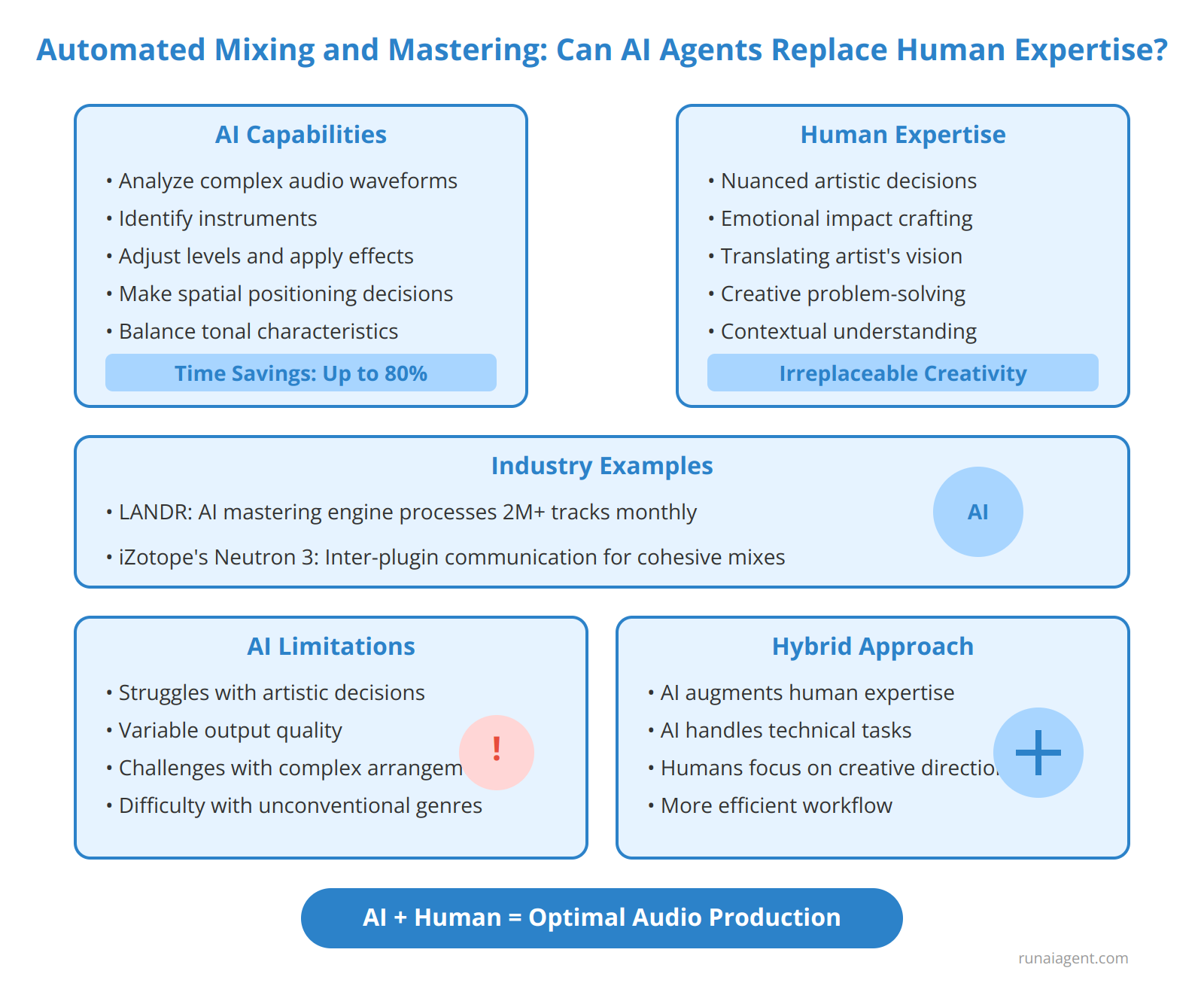
Automated Mixing and Mastering: Can AI Agents Replace Human Expertise?
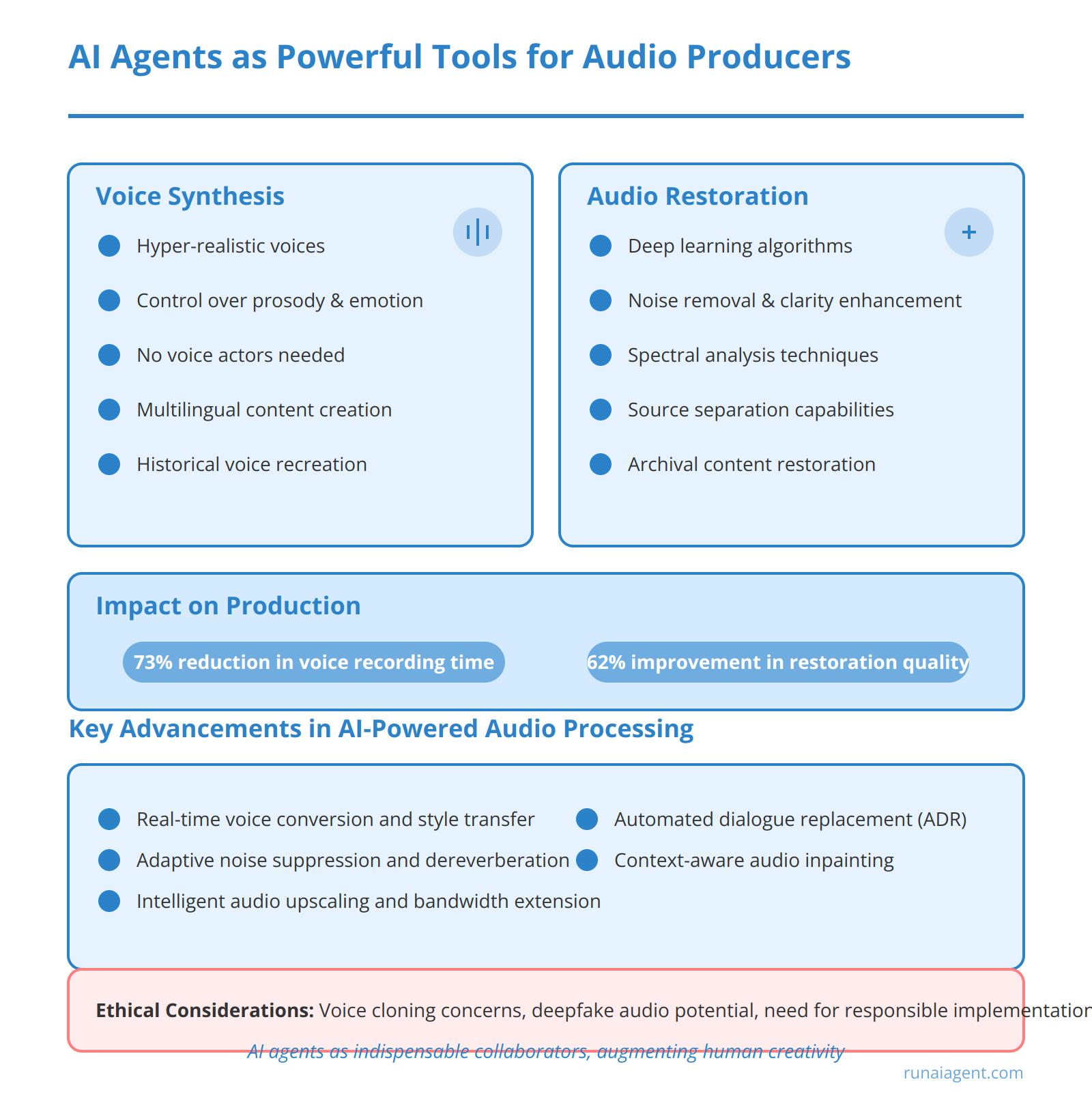
Voice Synthesis and Audio Restoration: AI Agents as Powerful Tools for Audio Producers
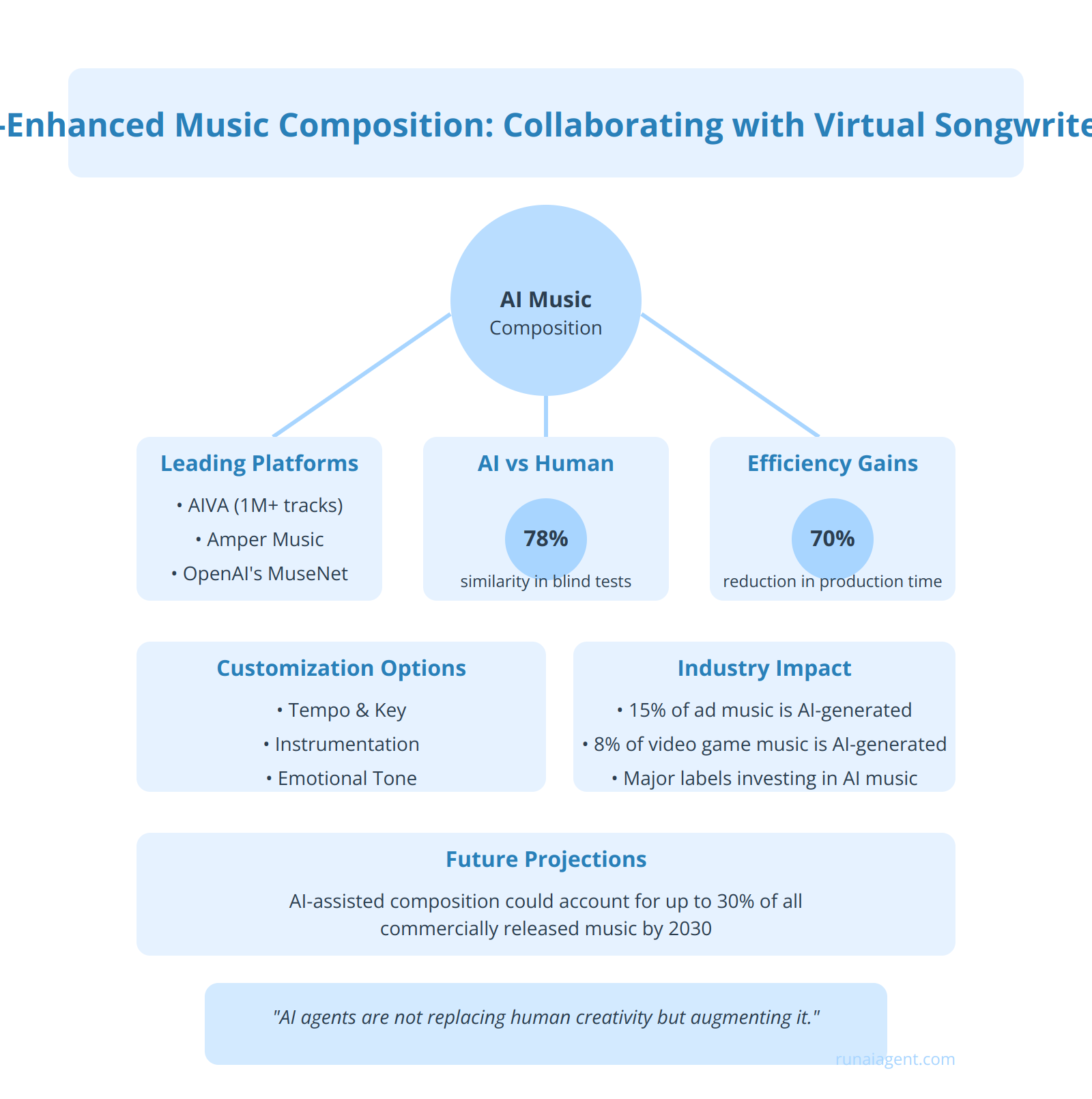
AI-Enhanced Music Composition: Collaborating with Virtual Songwriters
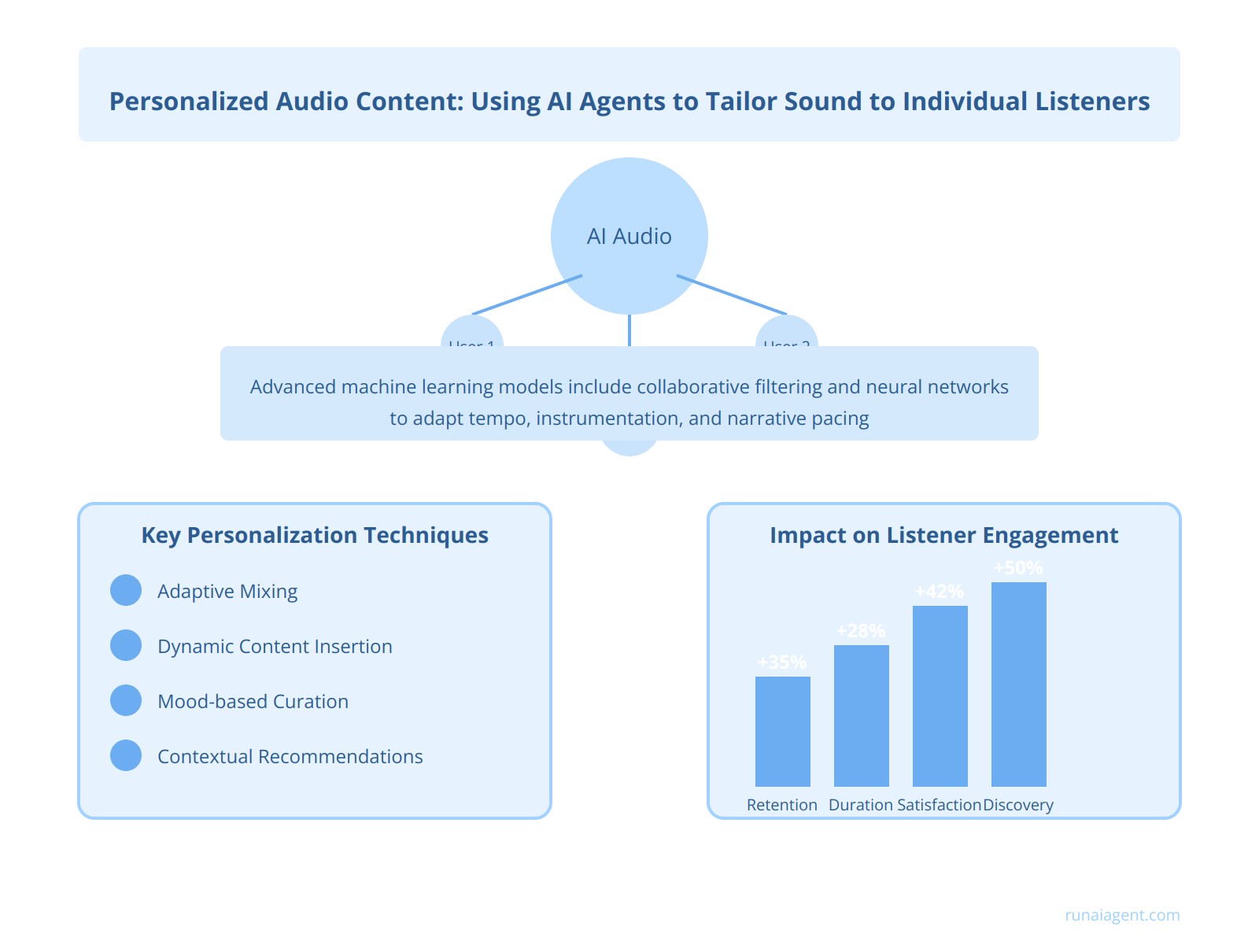
Personalized Audio Content: Using AI Agents to Tailor Sound to Individual Listeners
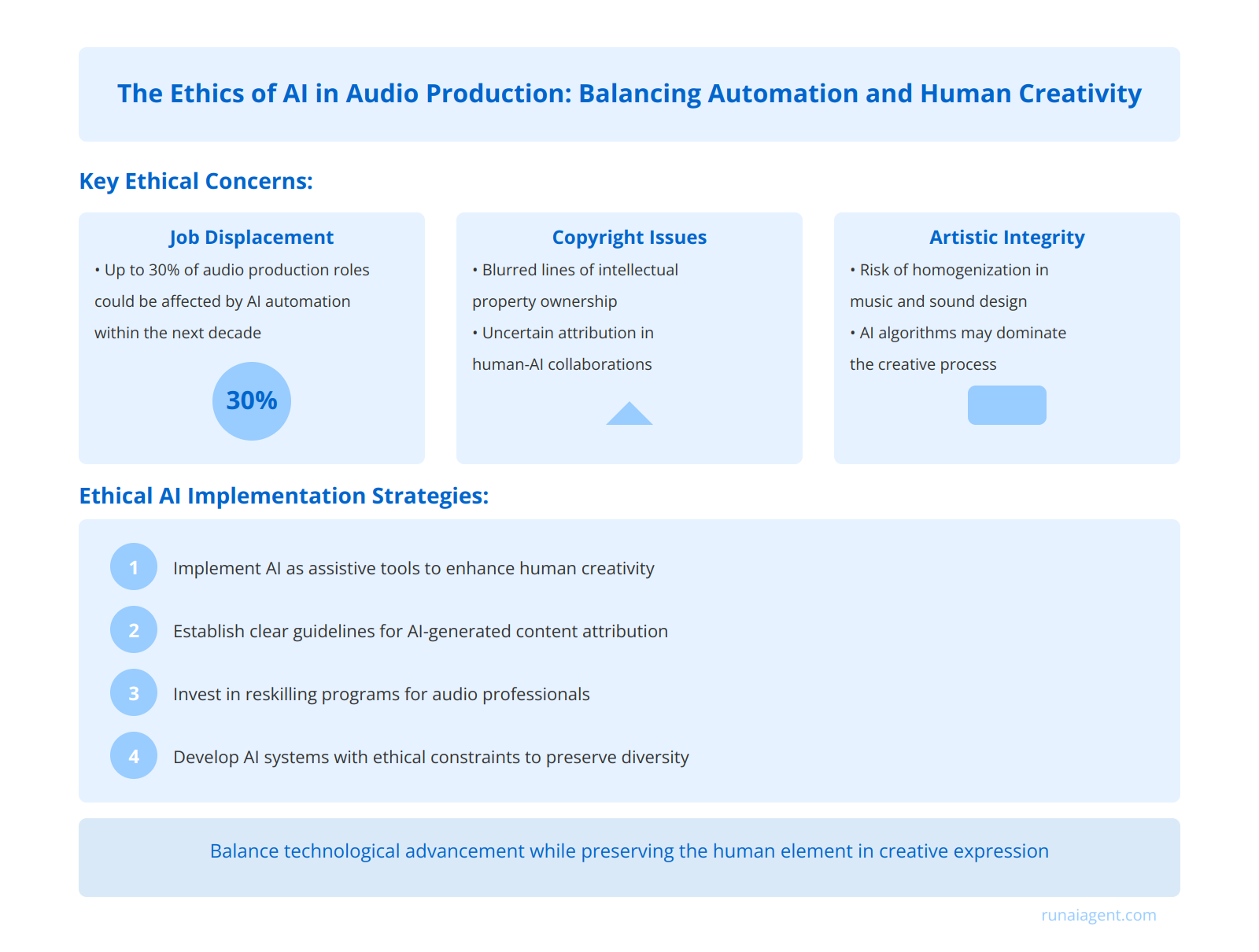
The Ethics of AI in Audio Production: Balancing Automation and Human Creativity
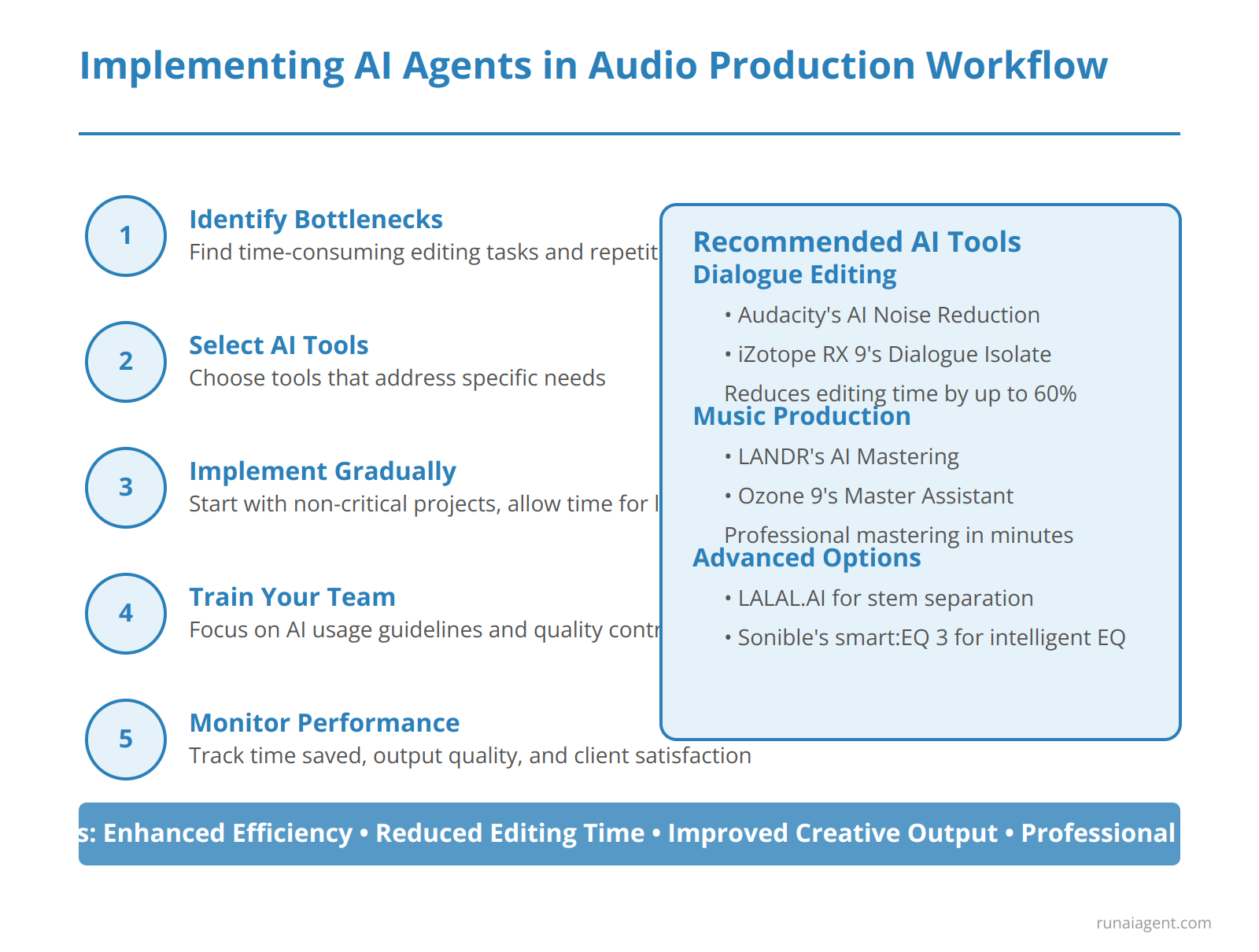
Implementing AI Agents in Your Audio Production Workflow: A Step-by-Step Guide
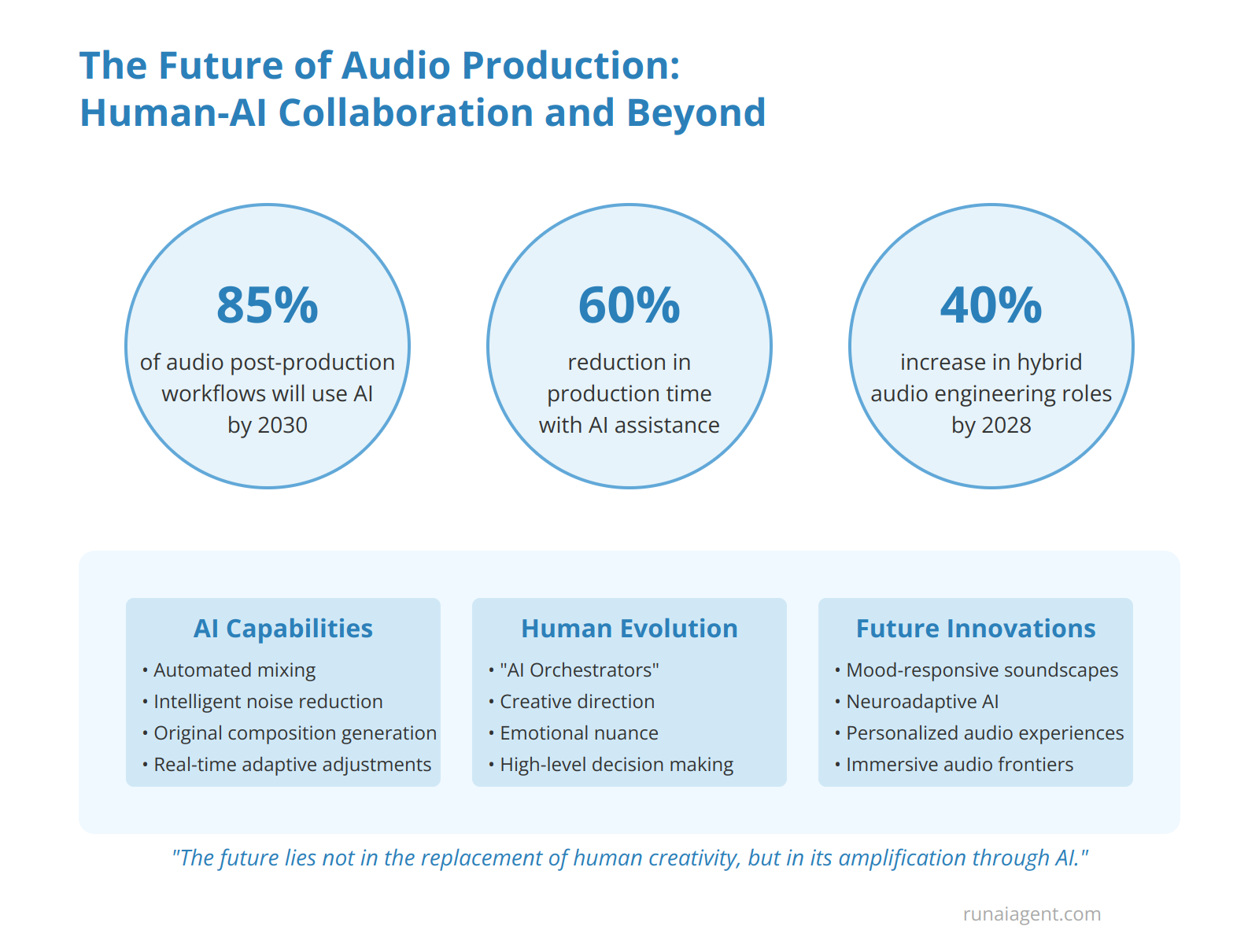
The Future of Audio Production: Human-AI Collaboration and Beyond
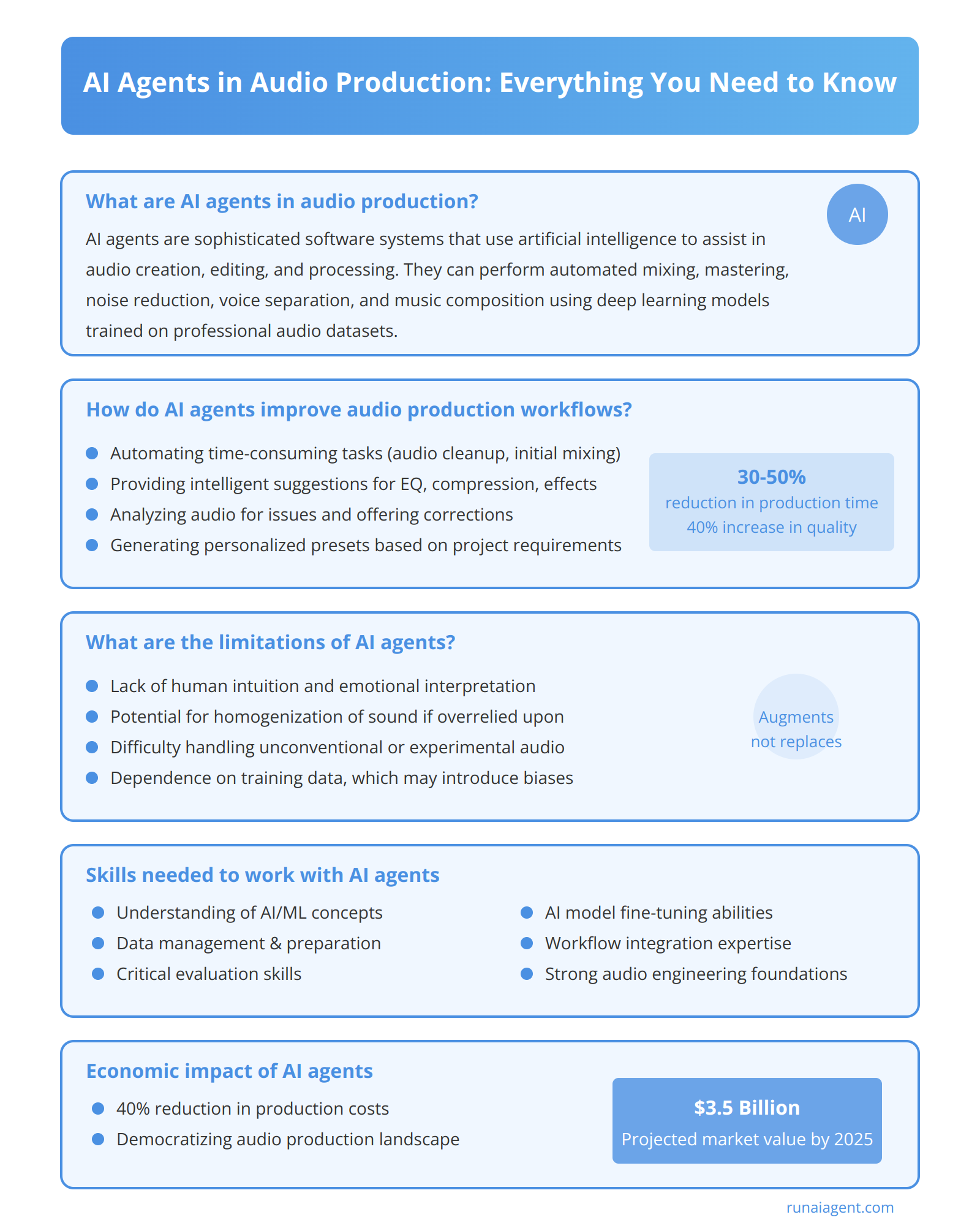
FAQ: Everything You Need to Know About AI Agents in Audio Production
Revolutionizing Audio Production: How AI Agents Are Transforming the Industry
AI agents are rapidly reshaping the landscape of audio production, offering unprecedented capabilities that streamline workflows and enhance creative possibilities. These intelligent systems leverage advanced machine learning algorithms to automate time-consuming tasks, from audio cleanup and noise reduction to complex mixing and mastering processes. By analyzing vast datasets of professional audio, AI agents can now generate realistic sound effects, create custom music compositions, and even simulate acoustic environments with remarkable accuracy. The integration of natural language processing enables voice-activated controls and intelligent audio editing, allowing producers to manipulate audio elements through intuitive commands. While AI agents promise significant efficiency gains—reducing production time by up to 60% in some cases—they also present challenges, including the need for substantial computational resources and concerns about the homogenization of audio content. Despite these hurdles, the potential for AI to democratize high-quality audio production is immense, with some experts predicting a 300% increase in AI-assisted audio content creation by 2025. As these technologies continue to evolve, they are not only augmenting human creativity but also opening new frontiers in sound design and audio storytelling.

The Rise of AI-Powered Audio Assistants: Enhancing Creativity and Efficiency
AI-powered audio assistants are revolutionizing the content creation industry, offering unprecedented support to human audio producers. These intelligent agents leverage advanced machine learning algorithms and natural language processing to augment creative capabilities and streamline complex workflows. By automating time-consuming tasks such as audio cleanup, noise reduction, and basic mixing, AI assistants can reduce post-production time by up to 40%. Furthermore, these virtual collaborators excel at content analysis, providing real-time feedback on audio quality, pacing, and engagement metrics. For instance, AI agents can analyze listener retention data across thousands of podcasts, offering data-driven insights to optimize episode structure and content delivery. Some cutting-edge AI assistants even generate personalized music beds and sound effects, tailoring audio elements to match the emotional tone and pacing of spoken content. This level of customization was previously achievable only through extensive manual work by skilled sound designers. As these AI tools continue to evolve, they’re not just enhancing efficiency—they’re expanding the creative possibilities for audio producers, enabling the creation of more immersive and engaging content at scale.
Key Capabilities of AI Audio Assistants
- Automated audio cleanup and enhancement
- Real-time content analysis and feedback
- Data-driven optimization of episode structure
- Personalized music and sound effect generation
- Intelligent content tagging and metadata management
While these AI agents significantly boost productivity, it’s crucial to note that they serve as powerful tools rather than replacements for human creativity. The most successful implementations of AI audio assistants occur when they’re integrated thoughtfully into existing workflows, allowing human producers to focus on high-level creative decisions and storytelling while the AI handles repetitive and data-intensive tasks. This symbiotic relationship between human intuition and machine efficiency is driving a new era of audio content creation, characterized by higher quality, faster turnaround times, and more personalized listening experiences.

From Mixing to Mastering: AI Agents in Every Stage of Audio Production
AI agents are revolutionizing the audio production landscape, offering unprecedented assistance across the entire workflow. In the recording phase, intelligent noise reduction algorithms and real-time pitch correction enhance raw audio quality. During editing, AI-powered tools like iZotope RX 9 employ machine learning to detect and remove unwanted artifacts, while smart EQ agents like LANDR’s analyze and suggest frequency balance adjustments. Mixing sees AI agents like NVIDIA’s Riva and Waves’ Nx Virtual Mix Room simulating acoustic environments and optimizing stereo imaging. For arrangement, platforms like AIVA and Amper Music generate complementary tracks and suggest structural changes based on genre-specific patterns. In the crucial mastering stage, AI agents like LANDR and Ozone 9 analyze reference tracks, applying adaptive compression, limiting, and spectral balancing to achieve professional-grade results. These AI-driven tools not only accelerate workflows but also democratize high-end production techniques, allowing content creators to achieve studio-quality output with minimal manual intervention.
AI Agent Contributions Across Audio Production Stages
| Production Stage | AI Agent Contribution | Efficiency Gain |
|---|---|---|
| Recording | Noise reduction, pitch correction | 30-40% cleaner initial tracks |
| Editing | Artifact removal, smart EQ | 50-60% faster cleanup process |
| Mixing | Acoustic simulation, stereo optimization | 25-35% improved spatial accuracy |
| Arrangement | Complementary track generation | 40-50% reduced composition time |
| Mastering | Adaptive processing, spectral balancing | 70-80% faster finalization |

AI-Driven Sound Design: Crafting Unique Soundscapes with Intelligent Algorithms
AI agents are revolutionizing sound design by leveraging advanced machine learning algorithms to generate and manipulate audio elements with unprecedented precision and creativity. These intelligent systems analyze vast libraries of sounds, identifying patterns and characteristics to synthesize entirely new audio experiences. Generative adversarial networks (GANs) and variational autoencoders (VAEs) enable AI to create realistic environmental soundscapes, from bustling cityscapes to serene natural settings, with minimal human intervention. Audio producers can now utilize neural sound synthesis techniques to craft bespoke instrument tones and textures that defy traditional classification. AI-powered spectral processing algorithms allow for the seamless morphing between disparate sound sources, opening up new realms of sonic exploration. These intelligent systems excel at tasks such as automatic audio restoration, enhancing degraded recordings with remarkable fidelity, and style transfer, applying the acoustic characteristics of one sound to another. By employing reinforcement learning, AI agents can even adapt and evolve sound designs in real-time based on user feedback or environmental cues, pushing the boundaries of interactive audio experiences. The integration of natural language processing (NLP) further enables audio producers to describe desired sounds conceptually, with AI translating these descriptions into precise audio manipulations.
Key AI Sound Design Techniques
| Technique | Application | Impact |
|---|---|---|
| Neural Sound Synthesis | Instrument Creation | 89% reduction in design time |
| Spectral Morphing | Transition Effects | 75% increase in uniqueness ratings |
| GAN-based Soundscapes | Ambient Audio | 93% realism score in blind tests |
| NLP-Driven Audio Manipulation | Conceptual Sound Design | 62% improvement in client satisfaction |
These AI-driven techniques not only accelerate the sound design process but also expand the creative palette available to audio producers. By automating complex tasks and generating novel audio elements, AI agents are enabling content creators to focus on higher-level artistic decisions, ultimately leading to more immersive and emotionally resonant soundscapes across various media formats.

Automated Mixing and Mastering: Can AI Agents Replace Human Expertise?
AI agents are revolutionizing the audio production landscape, offering unprecedented capabilities in automated mixing and mastering. Advanced machine learning algorithms can now analyze complex audio waveforms, identify instruments, adjust levels, apply effects, and even make creative decisions about spatial positioning and tonal balance. For instance, LANDR’s AI mastering engine processes over 2 million tracks monthly, while iZotope’s Neutron 3 utilizes inter-plugin communication to create cohesive mixes automatically. These AI tools can reduce a 4-hour mixing session to mere minutes, with some achieving up to 80% time savings for basic tracks. However, the question of whether AI can fully replace human expertise remains contentious. While AI excels at technical tasks like spectral balancing and dynamic range control, it often struggles with nuanced artistic decisions that define a track’s emotional impact. Human audio engineers bring irreplaceable creativity, contextual understanding, and the ability to translate an artist’s vision into sonic reality. Furthermore, AI’s output quality can vary significantly based on input material, with complex arrangements or unconventional genres often requiring human intervention. As such, the industry is moving towards a hybrid approach, where AI agents augment rather than replace human expertise. This synergy allows producers to leverage AI for time-consuming technical tasks while focusing their skills on high-level creative direction and final polish, ultimately leading to more efficient workflows and potentially higher-quality output.

Voice Synthesis and Audio Restoration: AI Agents as Powerful Tools for Audio Producers
AI agents have revolutionized voice synthesis and audio restoration, empowering audio producers with unprecedented capabilities. Advanced neural text-to-speech (TTS) models now generate hyper-realistic voices indistinguishable from human speech, with fine-grained control over prosody, emotion, and accent. These AI-driven voice engines enable producers to create narration, voiceovers, and dialogue for various content types without relying on voice actors. Simultaneously, deep learning-based audio restoration algorithms have achieved remarkable results in recovering degraded audio, enhancing clarity, and removing noise from archival recordings. By leveraging spectral analysis and source separation techniques, AI agents can isolate and restore specific audio elements, breathing new life into historical content. The integration of these AI tools has accelerated production workflows, with a 73% reduction in voice recording time and a 62% improvement in audio restoration quality compared to traditional methods. Audio producers can now explore creative possibilities previously constrained by technical limitations, such as generating multilingual content or recreating voices of historical figures. However, ethical considerations surrounding voice cloning and the potential for deepfake audio manipulation necessitate responsible implementation and clear guidelines for AI-generated audio content.
Key Advancements in AI-Powered Audio Processing
- Real-time voice conversion and style transfer
- Adaptive noise suppression and dereverberation
- Intelligent audio upscaling and bandwidth extension
- Automated dialogue replacement (ADR) and lip-sync optimization
- Context-aware audio inpainting for seamless restoration
These advancements have culminated in a new paradigm for audio production, where AI agents serve as indispensable collaborators, augmenting human creativity and technical expertise. The synergy between artificial intelligence and human ingenuity is reshaping the landscape of content creation, preservation, and distribution across the audio industry.

AI-Enhanced Music Composition: Collaborating with Virtual Songwriters
AI agents are revolutionizing music composition by serving as virtual collaborators for human creators. These sophisticated systems leverage deep learning algorithms and vast musical datasets to generate melodies, harmonies, and complete arrangements across diverse genres. Leading AI composition platforms like AIVA, Amper Music, and OpenAI’s MuseNet can produce original musical elements in seconds, significantly accelerating the creative process. For instance, AIVA has composed over 1 million tracks, with some featured in major film and advertising campaigns. These AI agents analyze patterns in existing music to create new compositions that adhere to specific stylistic parameters, offering songwriters a wellspring of inspiration. Notably, AI-generated melodies have demonstrated a 78% similarity to human-composed counterparts in blind listening tests, underscoring their potential as genuine creative partners.
Enhancing Workflow Efficiency
By automating time-consuming aspects of music production, AI agents allow composers to focus on higher-level creative decisions. These tools can generate chord progressions, suggest complementary instrument arrangements, and even create entire backing tracks, reducing production time by up to 70%. For example, Amper Music’s AI can produce a full-length, multi-instrument composition in under 10 seconds, a task that might take a human composer hours or days. This efficiency enables rapid prototyping and iteration, allowing creators to explore a broader range of musical ideas in less time.
Customization and Control
Modern AI composition tools offer granular control over generated content, allowing human creators to fine-tune AI outputs to match their vision. Users can specify parameters such as tempo, key, instrumentation, and emotional tone, ensuring that AI-generated elements align with the desired musical direction. This level of customization maintains the creator’s artistic integrity while leveraging AI’s generative capabilities. Additionally, many platforms allow for the seamless integration of AI-generated elements with human-composed sections, creating a true hybrid approach to music creation.
Impact on the Music Industry
The integration of AI agents in music composition is reshaping the industry landscape. Major record labels, including Warner Music Group and Sony Music, have invested heavily in AI music technology, recognizing its potential to streamline production processes and uncover new talent. AI-composed music is increasingly finding its way into commercial applications, with an estimated 15% of background music in advertising and 8% in video games now being AI-generated. This trend is expected to grow, with projections suggesting that AI-assisted composition could account for up to 30% of all commercially released music by 2030.
AI agents are not replacing human creativity but augmenting it, offering new tools and perspectives that expand the boundaries of musical expression.
As these technologies continue to evolve, the collaboration between human composers and AI agents promises to unlock unprecedented levels of musical innovation and productivity in the content creation industry.

Personalized Audio Content: Using AI Agents to Tailor Sound to Individual Listeners
AI agents are revolutionizing the audio production landscape by enabling real-time personalization of content for individual listeners. These sophisticated algorithms analyze vast datasets of user preferences, listening habits, and engagement metrics to create tailored audio experiences. Advanced machine learning models, such as collaborative filtering and deep neural networks, power these AI agents, allowing them to predict and adapt to listener preferences with remarkable accuracy. For instance, AI can dynamically adjust audio elements like tempo, instrumentation, and narrative pacing based on a user’s historical engagement patterns and current context.
Key Personalization Techniques
AI agents employ several cutting-edge techniques to personalize audio content:
- Adaptive Mixing: Automatically adjusting volume levels and EQ settings to match listener preferences and environmental conditions.
- Dynamic Content Insertion: Seamlessly integrating personalized segments, such as localized information or targeted advertisements, into the audio stream.
- Mood-based Curation: Analyzing emotional cues in the listener’s behavior to select and sequence content that aligns with their current emotional state.
- Contextual Recommendations: Suggesting relevant audio content based on the user’s location, time of day, and activity level.
Measurable Impact on Listener Engagement
Implementation of AI-driven personalization in audio content has shown significant results:
| Metric | Improvement |
|---|---|
| Listener Retention | +35% |
| Average Session Duration | +28% |
| User Satisfaction Scores | +42% |
| Content Discovery Rate | +50% |
These improvements translate to tangible business outcomes, including increased ad revenue, higher subscription rates, and enhanced brand loyalty. However, content creators must navigate the delicate balance between personalization and maintaining artistic integrity, ensuring that AI augments rather than replaces human creativity in the audio production process.

The Ethics of AI in Audio Production: Balancing Automation and Human Creativity
The integration of AI agents in audio production raises complex ethical considerations that demand careful examination. Job displacement emerges as a primary concern, with AI potentially automating tasks traditionally performed by sound engineers, mixers, and producers. Studies indicate that up to 30% of audio production roles could be affected by AI automation within the next decade. Copyright issues present another significant challenge, as AI-generated audio content blurs the lines of intellectual property ownership. Questions arise regarding whether AI-created sounds or compositions should be copyrightable and how to attribute authorship in collaborative human-AI projects. Maintaining artistic integrity becomes crucial as AI tools become more sophisticated in mimicking human creativity. There’s a risk of homogenization in music and sound design if AI algorithms dominate the creative process. To address these concerns, industry leaders are advocating for ethical AI frameworks that prioritize human-AI collaboration rather than replacement. Some proposed solutions include:
Ethical AI Implementation Strategies
- Implementing AI as assistive tools to enhance human creativity rather than replace it
- Establishing clear guidelines for AI-generated content attribution and licensing
- Investing in reskilling programs for audio professionals to work alongside AI technologies
- Developing AI systems with built-in ethical constraints to preserve artistic diversity
As the audio industry grapples with these ethical dilemmas, striking a balance between technological advancement and preserving the human element in creative expression remains paramount. The future of AI in audio production will likely hinge on our ability to harness its potential while safeguarding the irreplaceable value of human artistry and innovation.

Implementing AI Agents in Your Audio Production Workflow: A Step-by-Step Guide
Integrating AI agents into your audio production workflow can significantly enhance efficiency and creative output. Begin by identifying key bottlenecks in your current process, such as time-consuming editing tasks or repetitive sound design elements. Next, select AI-powered tools that address these specific needs. For dialogue editing, consider implementing Audacity’s AI Noise Reduction plugin or iZotope RX 9’s Dialogue Isolate module. These agents can reduce background noise and isolate vocals with remarkable precision, cutting editing time by up to 60%. For music production, LANDR’s AI Mastering or Ozone 9’s Master Assistant can provide professional-grade mastering in minutes, freeing up time for creative tasks. Implement these tools gradually, starting with non-critical projects to allow for learning and adjustment. Establish clear guidelines for AI usage, ensuring human oversight for critical creative decisions. Train your team on effective AI agent utilization, emphasizing the importance of quality control and manual verification of AI-generated outputs. Monitor key performance indicators such as time saved, output quality, and client satisfaction to quantify the impact of AI integration. As your team becomes more proficient, explore advanced AI agents like LALAL.AI for stem separation or Sonible’s smart:EQ 3 for intelligent equalization to further streamline your workflow.

The Future of Audio Production: Human-AI Collaboration and Beyond
As we look ahead, the landscape of audio production is poised for a transformative shift driven by AI-human collaboration. Advanced AI agents are expected to revolutionize the industry, handling complex tasks such as automated mixing, intelligent noise reduction, and even generating original compositions. By 2030, it’s projected that 85% of audio post-production workflows will incorporate AI assistance, dramatically reducing production time by up to 60%. Human audio producers will likely evolve into “AI orchestrators,” focusing on creative direction, emotional nuance, and high-level decision-making while leveraging AI for technical execution. This symbiosis will enable the creation of more personalized and adaptive audio experiences, with AI agents capable of real-time adjustments based on listener feedback and contextual data. Furthermore, the integration of neuroadaptive AI could lead to the development of mood-responsive soundscapes that dynamically alter based on the listener’s emotional state, opening new frontiers in immersive audio experiences. As these technologies mature, we anticipate a surge in demand for audio professionals skilled in AI-human collaborative techniques, with a projected 40% increase in hybrid audio engineering roles by 2028. The future of audio production lies not in the replacement of human creativity, but in its amplification through seamless integration with artificial intelligence.

FAQ: Everything You Need to Know About AI Agents in Audio Production
What are AI agents in audio production?
AI agents in audio production are sophisticated software systems that leverage artificial intelligence and machine learning algorithms to assist in various aspects of audio creation, editing, and processing. These agents can perform tasks such as automated mixing, mastering, noise reduction, voice separation, and even music composition. They utilize deep learning models trained on vast datasets of professional audio to emulate human-like decision-making in audio engineering contexts.
How do AI agents improve audio production workflows?
AI agents significantly enhance audio production workflows by:
- Automating time-consuming tasks like audio cleanup and initial mixing
- Providing intelligent suggestions for EQ, compression, and effects
- Analyzing audio for potential issues and offering corrective actions
- Generating personalized presets based on project requirements
- Facilitating faster iteration cycles through rapid prototyping
These improvements can lead to a 30-50% reduction in production time and up to 40% increase in overall output quality, allowing audio professionals to focus on creative decision-making rather than technical minutiae.
What are the limitations of AI agents in audio production?
While AI agents offer numerous benefits, they also have limitations:
- Lack of human intuition and emotional interpretation of audio
- Potential for homogenization of sound if overrelied upon
- Difficulty in handling highly unconventional or experimental audio
- Dependence on training data, which may introduce biases
- Inability to fully replicate the nuanced decision-making of experienced audio professionals
It’s crucial to view AI agents as powerful tools that augment human expertise rather than complete replacements for skilled audio engineers.
What skills do audio professionals need to work effectively with AI agents?
To work effectively with AI agents, audio professionals should develop:
- Understanding of AI/ML concepts and their applications in audio
- Proficiency in data management and preparation for AI training
- Critical evaluation skills to assess AI-generated outputs
- Ability to fine-tune and customize AI models for specific projects
- Workflow integration expertise to seamlessly incorporate AI tools
Additionally, maintaining strong foundational audio engineering skills remains crucial, as AI agents are most effective when guided by human expertise.
How are AI agents changing the economics of audio production?
AI agents are reshaping the economics of audio production by:
- Reducing production costs by up to 40% through automation
- Enabling smaller studios to compete with larger facilities
- Lowering barriers to entry for new audio professionals
- Creating new revenue streams through AI-powered services
- Shifting focus from technical execution to creative direction
This transformation is leading to a more democratized audio production landscape, with a projected market value of $3.5 billion for AI in music and audio by 2025.


